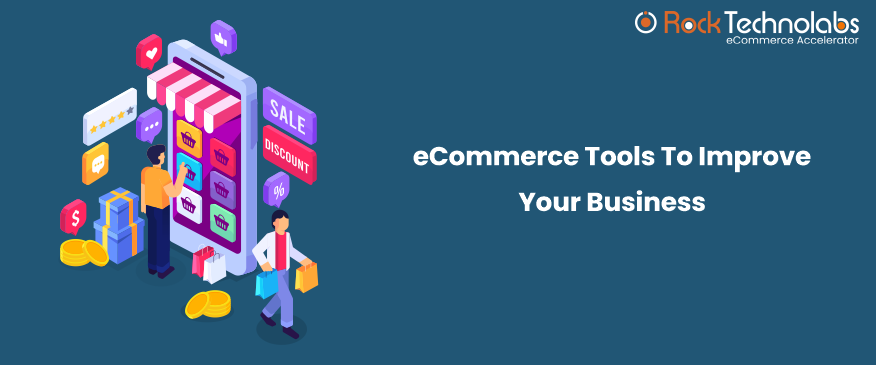Best eCommerce Tools To Scale Your Business in 2023

If you want to save time and cut down costs to manage your eCommerce store, you should look into using ecommerce tools and technologies. Nowadays, there are thousands of online resources that can help you get started or even manage your entire store.
There are dozens of ways to start selling online, from creating a basic web page to building a fully-featured ecommerce site. While some require technical skills, others allow anyone to launch their own store in minutes. So, whether you’re looking for something simple or complex, here are different types of ecommerce website tools that you need for success.
What is an eCommerce Tool?
E-Commerce tools are programs or software programs like extensions, plug-ins, platforms, and apps that provide additional features and functionalities to enhance the capabilities of your ecommerce business websites. These eCommerce tools help merchants to manage their online stores and make their business processes more productive and efficient.
Why Should You Use eCommerce Tools for Your Online Shop?
These tools might be varied in terms of features and functionalities, but their purpose is common and that is to automate, organize, simplify, and streamline a wide range of tasks and processes of growing an eCommerce store. From ERP system integration to abandoned shopping cart recovery, ecommerce tools are deployed to enhance website operation, conversion strategies, communication, etc. in ecommerce websites.
In this guide, we’ve tried to cover some of the best ecommerce tools that you can use to gain insights, manage workflows, optimize your content, create rewards programs, ad campaigns, and more.
What Tools are Needed for an Ecommerce Website?
There are various kinds of eCommerce tools to manage, create, monitor, and boost your online ecommerce store. We have mentioned some ecommerce tools, each used for different purpose. From providing ecommerce platform, marketing, research to social media, let’s have a look at these different types of e-commerce tools most commonly used by online businesses.
Ecommerce platforms
1. Adobe Commerce
Magento, now an Adobe Commerce, is considered the King of eCommerce development platforms. Magento owned by Adobe is specialized in ecommerce websites. It is an open-source platform. Magento store owners can access a lot of unique features and benefits offered by this platform that help them connect with their customers and sell their products online. It is an adaptable and more secure platform for an online business or eCommerce. It is a standout amongst other eCommerce platforms regarding security, support & features. With the help of adobe commerce development services, you can develop a completely versatile and better eCommerce store.
2. Shopify
Shopify is the leading platform powering online retailers around the world. Its features including marketing automation, inventory management, product catalogs, sales channels, shipping tools, payment gateway, order analytics, and more make it a powerful solution for any business. Shopify helps sellers manage their entire customer journeys seamlessly across multiple channels. Whether it’s managing orders, setting up email marketing campaigns, promoting products, integrating with other systems, or accepting payments – it does it all.
3. Woo Commerce
Woo Commerce is a fully-integrated open-source ecommerce shopping cart plugin for WordPress. It works flawlessly with significant themes, giving users complete control over their store appearance. Woo Commerce is extremely flexible and easily customizable. Users can add unlimited categories, variations, attributes, images, prices, tax classes, and more. The best thing about Woo Commerce is it’s free! Woo Commerce includes all the functionality of high-end software at no cost. In fact, it even comes with a built-in blog engine, integrated SEO, social media sharing buttons and many more premium features included.
4. Big Cartel
Big Cartel is an online store builder for artists to set up their online shop. Creative and artistic sellers can create their unique customized stores and sell their products. Sellers can choose between three different pricing plans depending on how they want to monetize their stores. All products come with a 100% satisfaction guarantee. Contact their friendly staff if you have any questions regarding a purchase. Their website is super simple to use, and they offer outstanding customer service.
Business Tools
1. Canva
Canva is an online graphic design tool to quickly creates distinctive and appealing corporate and personal visual designs. This tool has a massive and professionally designed template library along with easy-to-use drag-and-drop functionality that helps you have a professional design even when you have no design skills.
2. Veeqo
Keeping inventory balanced and in check is essential for all retail businesses. Yet, it can be one of the most complicated tasks. Veeqo is an inventory management solution that helps small businesses that sell across multiple channels stay on top of orders and avoid overselling. Veeqo offers 40+ integration to extract inventory from all your channels in real time, updating all your stores when you make a sale.
3. Slack
Slack is a platform designed to organize, simplify and streamline team communication by enabling you to create multiple communication channels that are organized by topic. Ability to collaborate with team members in real-time and receive automatic notifications for each new message using Slack’s well-polished chat feature.
4. Sourcify
A one-stop service for businesses that desire to manufacture a product and manufacturers looking for customers, Sourcify reduces the risk associated with the manufacturing process by examining its manufacturers. The service offers a money-back guarantee if the store owners are unhappy with the final product.
5. Monday
Monday is one of the best project management tools that have a streamlined UI and can be customized according to your project needs. Create project boards using this tool and assign them to different team members. Collaborate with all team members and track the productivity of their work. Monday integrates and syncs really well with other apps like Google Calendar, Stripe, MailChimp, Zendesk, Microsoft Teams, and several others.
6. Quickbooks
Quickbooks is one of the best accounting software for small businesses of those reviewed. All accounting features can be conveniently accessed, making bookkeeping more efficient.
7. ShipBob
ShipBob offers simple, fast, and affordable fulfillment for eCommerce businesses and crowdfunding campaigns.
8. Trello
Trello makes organizing fun for small and medium businesses through options to prioritize tasks on Trello boards, assign work, add deadlines, and much more!
9. Appointo
Experience seamless appointment scheduling with Appointo, the first choice for businesses of all sizes. Our intuitive software streamlines the booking process, saving you time and maximizing efficiency. From managing client appointments to organizing team schedules, Appointo offers unparalleled flexibility and convenience. Say goodbye to scheduling headaches and hello to smooth operations with Appointo – the ultimate appointment scheduling solution for every business.
Research Tools
1. Semrush
Semrush is the most popular SEO tool used by digital marketers. This tool is specialized in keyword research, runs an SEO audit of your blog, competitor analysis rank tracking, Google Ad campaign optimization, backlinking opportunities, social media management, market analysis, link building, and lots more.
SEM Rush has many features for marketers, including what keywords your competitors are using and showing you the best-performing examples of ad copy used by your competitors and industry leaders.
2. Ahrefs
Ahrefs is a very popular SEO software suite that is used to analyze a website’s link profile, link building, analyze SEO health, keyword research, link highlighter, rank tracking, competitor analysis, on-page SEO report, and site audits.
Ahrefs allows users to research their competitors’ ads, find out what keywords they are bidding on, and see where their traffic is coming from.
3. Google Keyword Planner
Google Keyword Planner is a keyword tool built into Google Ads and is free to use. It will provide suggestions for new keywords and give you information about search volumes and estimated cost per click.
4. Google Trends
Google Trends is a website and free tool by Google that analyzes the popularity of top search queries in Google using real-time data and shows how popular different keywords, phrases, and subjects are over time. This trend search feature by Google provides data and graphs on the popularity of specific search terms used on Google and YouTube.
Google Trends helps you see the search volume for a given keyword. It allows you to see whether there is more demand for a particular product or service at different times of the year, and then optimize your Google Ads accordingly.
Marketing Tools
1. Mailchimp
Mailchimp is the most important tool available to do Email Marketing. Some of the benefits of using Mailchimp are: helps you build strong brand awareness, gives you lead generation, helps you build a community to relate to via mailing lists, and allows you to convert leads into customers.
3. Yotpo
Yotpo was founded in 2011 with a mission to provide brands with everything they need to create the best customer experience, from brand discovery to purchasing. With state-of-the-art solutions in SMS marketing, loyalty & referrals, subscriptions, reviews, and user-generated visual content, Yotpo is helping brands accelerate their growth. Brands can effectively leverage their customers’ personal experiences to increase trust and sales, as well as steady revenue, with customer engagement across all channels.
Analytics Tools
1. Google Analytics
Google Analytics is one of the best ways to monitor and keep track of your work by analyzing the data:
- Get insights into user behavior
- Detect issues early
- Where your users are coming from
- Monitor your site’s performance
- Track your conversions
- Make data-driven decisions
2. Kissmetrics
Kissmetrics is perfect for eCommerce marketers who require a wide variety of metrics. Discover the visitor-to-purchase conversion rate, the average revenue per person, and the cart-to-purchase conversion rate.
3. HotJar
Hotjar is a visual tool that helps you see how your user interacts with your site using heatmaps.
Magento 2 Google tag manager
If you use the Magento platform, a google tag manager is a great utility. The Magento 2 google tag manager enables quick, easy, and convenient data measurement. The Magento 2 Google Tag Manager extension enables quick, easy, and convenient data measurement. Only simple tag modification processes—complex source codes are gone. A properly integrated system includes website tagging, Google Analytics Advanced Ecommerce, Google Adwords Conversion Tracking, and Facebook Pixel.
Highlighting Features:
- Improve website performance
- GTM Support Dynamic Remarketing
- Google Tag Manager Enhanced eCommerce
- Facebook Pixel is integrated in Google Tag Manager
Customer Support Tools
1. Zendesk
With Zendesk, you can optimize your production efficiency and build a robust brand identity with comprehensive CX reports! Zendesk helps your support service work steadily even with large customer volumes in peak sales hours.
2. Helpscout
Help Scout is a dedicated customer support platform built for growing business teams to deliver great and best-in-class customer service.
3. Acquire
Acquire, is one of the most scalable and flexible customer support software that offers a unified customer service platform for connected conversations across digital channels. This tool meets the customer service, support, and sales needs of any business — on any device.
Social Media Tools
1. Sprout Social
SproutSocial is all in one social media solution that helps merchants to build long-term loyalty and engagement. With Sprout’s tools at your fingertips, you can explore the social listening component and continue to monitor performance, using the reporting and insights tools! This tool enables brands to leverage the power of social to grow their business.
2. Hootsuite
Got multiple social media accounts for your business? Handle them all efficiently and never miss a posting with Hootsuite. One of the best tools to manage all your social media platforms, schedule posts, and get analytics in one place.
3. Buffer
Buffer is designed to grow the audience on social media platforms and beyond. One can publish, engage, analyze, and drive more traffic to the most valuable content. Buffer allows organizing and scheduling the content for automated publishing, as well as detailed social media analytics to determine what’s working well and what isn’t.
Utilize These eCommerce Tools to Optimize The Overall Performance of Your Store:
Leveraging the right ecommerce tools provides a plethora of benefits that are sure to help you grow the success of your online store. To learn more about how integrating eCommerce tools into your online store can streamline your business workflow process, contact us today!





